

Over the past month, we've seen the S&P 500 (first chart) rebound by about 11%, and we've seen the volatility index (second chart - measures expected market volatility over the next 30 days) decline markedly from last month's high. It's no surprise that over this same period the "experts" have once again been coming out of the woodwork to proclaim that the worst is behind us and that this is a great buying opportunity. Of course, many of these gurus never noticed this huge credit bubble building or foresaw its demise. Regardless, CNBC doesn't hesitate to reserve plenty of air time for their endless droning.
For the sake of fairness, there's always a chance that we have seen the worst, and there's a chance that the stock market could rally to new highs and beyond this year. There's also a chance that professional lawn bowling will take our country by storm or that a global tone deafness virus will sufficiently affect the population to allow me to become the next American Idol.
In my humble and increasingly out-of-favor view, what we are witnessing is standard bear market activity. As discussed in an earlier post, just as bull markets are marked by the occasional 10%+ retrenchment, bear markets experience the occasional 10%+ rally. Sentiment swings violently and on a dime. One minute, everyone is fearing Armageddon and the next everyone is shoving Granny out of the way to get in "at the bottom".
Why my continued pessimism? Here is a brief summary of a few concerns:
- Economic growth in recent years was fueled largely by an ever-increasing amount of debt rather than through savings. This was never sustainable long-term and is finally reversing.
- Consumers became increasingly reliant on extracting equity from their homes this decade in order to fund their lifestyle. With home prices off sharply and mortgage availability far more limited, this source of "income" is largely gone.
- Higher oil prices are likely here to stay. Though they could dip somewhat in the face of a global economic slowdown, the longer-term trend is likely to be higher as high depletion rates and limited significant exploration success fail to keep up with growing demand.
- Roughly 70% of GDP comes from consumer spending. The consumer is stretched to the max as evidenced by soaring foreclosure rates and credit card defaults. In addition, wage growth has been anemic. It's time for the consumer to start saving and rebuild his/her balance sheet.
- The housing market is likely to be weak for much longer than most expect. Sales are plummeting and inventory continues to grow. In the hot markets that experienced the most overheating, asking prices still bear no relation to rents - as they should. Ultimately, prices will need to fall to levels that make houses more affordable for homeowners or to levels at which investors can rent them out for a positive cash flow.
- We haven't even begun to see the impact of Option ARM defaults. These will be rolling to higher interest rates in the next couple of years, and it's likely that the loss experience of these homeowners won't be terribly different than that of the subprime lot.
- State and local budgets are going to become a big issue. With tax receipts falling and expenditures remaining high, many states will be faced with some hard choices given their balanced budget mandates. Taxes will need to be raised and/or spending cut.
- Banks remain very hesitant to lend. Liquidity is king. There is plenty of corporate debt coming due in the next couple of years, and it will be crucial for companies to roll this debt over at reasonable rates. Otherwise, interest expense will increase and/or shareholders will experience dilution as more companies are forced to sell stock to redeem their debt.
- The losses banks have taken thus far have been largely mark-to-market accounting related losses. Once the slowing economy begins to impact the general economy, we will see increasing corporate defaults.
- More and more companies are lowering their capital expenditure plans and announcing layoffs. Clearly, the financial industry is currently experiencing a net outflow of jobs. This will likely start to trickle through much of the rest of the economy this year.
- Inflation continues to surge, regardless of what the corrupt government statistics indicate. We all know what we're paying for gas, food, utilities, education, health care, etc.
- With the dollar weakening and inflation rising, it wouldn't be surprising if our lenders (China, Japan) soon started demanding a higher interest rate on their government security purchases. This would help the dollar but wreak havoc on an already weak economy.
I do believe that, although the bulls are back in control for the moment, we will look back at this rally and see that it was another dead-cat bounce (bear market rally). Near-term, I intend to add to select short positions. The stock market has held up well so far during this earnings season, but this is more a function of expectations having been set unreasonably low going into the earnings reports. When you expect Armageddon but end up with purgatory that looks like good news. I expect a fairly ugly pre-announcement season for next quarter and will increase my shorts leading into it should the market continue to move higher and sentiment remain bullish.
